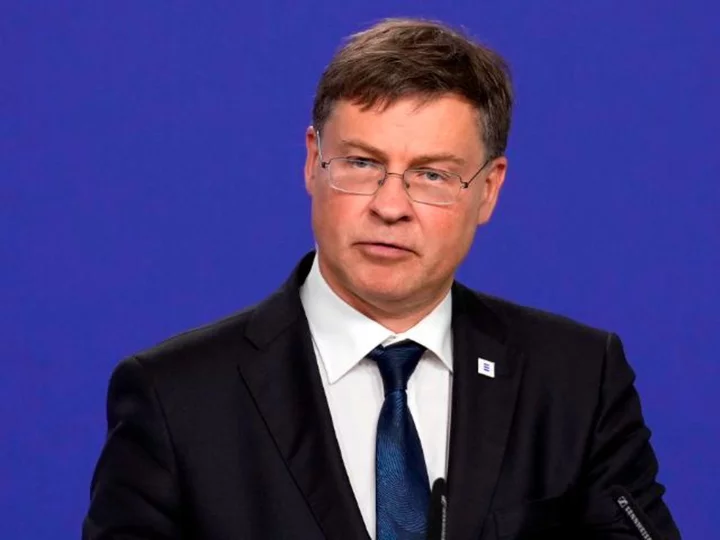China's unfair trade practices have forced the European Union to become more assertive in its dealings with the world's second largest economy, the bloc's commissioner for trade said Monday during a trip to Beijing.
But Europe has no intention of cutting relations with China or seeking self-sufficiency or import substitution, Valdis Dombrovskis said during a Monday keynote speech at Tsinghua University.
"We urge China to address the lack of reciprocity in our economic relationship," Dombrovskis said. "The EU welcomes competition ... However, competition must be fair. And we will be more assertive in tackling unfairness."
The trade chief's visit comes as tensions flare between the bloc and China over trade imbalances and geopolitical issues. The bloc's trade deficit with China hit 396 billion euros ($421 billion) last year, which was "the highest in the history of mankind," Jorge Toledo, the EU ambassador to China, was quoted by Reuters as saying.
Half of that deficit was in vehicles and machinery, according to statistics from the EU. The rest was in other manufactured goods, chemicals and energy.
Earlier this month, the European Union launched an investigation into China's state support for makers of electric vehicles (EV) as soaring imports of its cars stoke fears for the future of European auto manufacturers. China's commerce ministry called the investigation "blatantly protectionist" earlier this month.
There are tensions in tech, too. China has slapped export curbs on two semiconductor materials in a warning shot to Europe and the United States, which have imposed restrictions limiting China's access to advanced chipmaking technology.
The EU, meanwhile, has expressed wider concerns about the business environment for European companies operating in China and the country's stance in the Ukraine war.
'Less transparency'
Dombrovskis said the Chinese government had created a more "politicised" business environment by expanding its toolkit to protect national security interests.
"This has resulted in less transparency, unequal access to procurement, discriminatory standards and security requirements, and data localisation and transfer requirements," he added.
Dombrovskis said China's new foreign relations law and its newly broadened counter-espionage law, in particular, were of "great concern" to European business.
In April, China expanded the scope of its already sweeping counter-espionage law in a move that analysts warn could create further legal risks or uncertainty for foreign companies in the country.
Two months later, it unveiled a sweeping foreign relations law enshrining its right to impose "countermeasures" against actions that it deems a threat. It was seen as Beijing's latest bid to bolster its position amid strained relations with the West.
The ambiguity of the laws means European companies struggle to understand their compliance obligations, Dombrovskis added.
The trade chief cited a June survey from the EU Chamber of Commerce in China that found that nearly two-thirds of respondents, a record high, indicated that doing business in the country had become more difficult.
According to the chamber, 30% of respondents reported revenue decreases compared to the previous year, an increase of 20 percentage points, and the highest on record.
Dombrovskis called on China to remain open in order to help it transition from an investment-led economy to a broad-based economy.
"By contrast, if China chooses the opposite path, it risks hampering the economic rebalancing it needs," he said.
He also mentioned the political and economic headwinds of Russia's invasion of Ukraine and how China positions itself on the issue.
Russia has become increasingly dependent on China since the Kremlin ordered the full-scale invasion of Ukraine in February 2022.
Trade between the two soared 40% in the first five months of this year, according to Chinese customs data, and earlier this month President Vladimir Putin praised his country's "excellent" economic ties with China.
— Lucas Liliholm and Manveena Suri contributed reporting.

